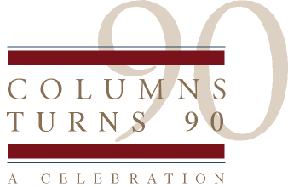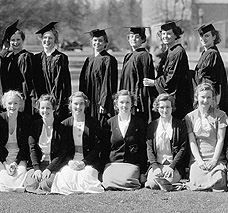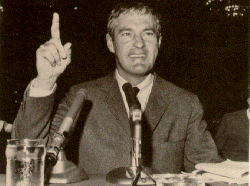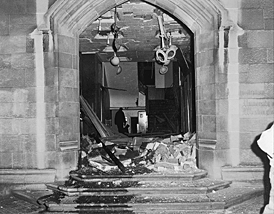

First Rose Bowl Victory
The grand-daddy of the bowls--the magnificent and impressive Rose Bowl--saw the first Coast Conference victory over the Big Ten as Washington shellacked Wisconsin 44-8. ... The estimated 25,000 people who traveled south from the State of Washington to view the Pasadena proceedings was by far the biggest exodus from an outlying state in the history of the game. Spring 1960.
Computer Power
A high-speed electronic digital computer, purchased recently by the UW for its new Pacific Northwest Computer Center, will be replaced by a faster and more efficient machine. ... A major feature of the IBM 709 is that it is more versatile than the 704 and has a core memory four times larger than would have been provided by the 704. ... The 709 computer will be the first of its kind to be installed on a university campus in the western United States outside of California. Summer 1960
Enrollment Boom
During the 1961-63 biennium, the University of Washington enrollment is expected to increase at the rate of 1,000 students per year. By 1970, the University's enrollment could reach 30,000, almost doubling in size in a single decade. October 1960
Taking the Measure of Jack Kennedy
"Kennedy will bring a different concept of the Presidency to the White House. Instead of relying on a huge staff and much delegation of authority, Kennedy will be in the center of action. He sees the Presidency as the centripetal force in our national government. I would expect great intellectual ferment of ideas and discussion without radical innovations. ... This new President will probably call for new goals and sights after the comfortable, tranquilizing '50s. Whether people will respond is problematical."--Political Science Professor Hugh Bone. January 1961

Kennedy Comes to Convocation
Eleven thousand students, faculty members and special guests crowded the Edmundson Pavilion as excited spectators of one of the greatest events in the University's history: the Academic Centennial Convocation marking the climax of the University's first century. ... The loudest applause was justly reserved for the man who had come all the way from Washington D.C. to deliver the Centennial address--President John F. Kennedy. In his stirring and much quoted speech, President Kennedy, after paying tribute to the University and its achievement, moved to the present world crisis and spoke eloquently of the need for wisdom and moderation.
"In 1961 the world relations of this country have become tangled and complex. One of our former allies has become our adversary, and he had his own adversaries, who are not our allies. Heroes are removed form their tombs, history rewritten, the names of cities changed overnight. We increase our arms at heavy cost primarily to make certain that we will never use them. We must face up to the chance of war if we are to maintain the peace. We much work with certain countries lacking in freedom in order to strengthened the cause of freedom. ... And as the most powerful defender of freedom on earth we find ourselves unable to escape the responsibilities of freedom and yet unable to exercise it without restraints imposed by the very freedom we seek to protect."--President John F. Kennedy, January 1962
The World of Theodore Roethke
Roethke's artistic and academic stature is matched by a physically imposing figure. Now 53 years old, he is over six feet tall, weighs upwards of 180 pounds. There is something distinctively bearish about him--his frame; his gait; the way he occupies a chair, combining a loose-limbed slouch with an animal alterness, one moment in comfortable repose and the next moment nervously pacing the room to quote a favorite poem or fetch a book from nearby shelves. Penetrating eyes are set in a remarkably plastic, almost amorphous face (it has been likened to Charles Laughton's)--a face which can reflect simultaneously exaltation and despair, profound sensitivity and an unmistakable hint of pugnacity. Spring 1962
Growing Pains
Since the University of 1962 cannot build a new campus in the deep woods, as it did in 1861 and again in 1895, where can it find the space it needs for continued growth? ... The campus can't expand, at reasonable expense, north into organized student residences, or west onto "The Avenue." East is Lake Washington and south is Lake Union. However, to the southwest is an area now being studied by the City of Seattle to determine its possible qualifications as a federally supported Urban Renewal project. Whether the University, through federal-community agreement, can grow into this area at relatively moderate cost will soon be decided. Summer 1962
Racial Segregation in Seattle
"In Seattle, as in all large American cities, the Negro population shows a marked degree of spatial segregation. This pattern of residential segregation is also manifested by other minority racial groups. In the development of Negro residential segregation patterns in the large city, the prejudice of the dominant white group, internal cohesion, and the comparatively low economic status of the Negro are particularly important factors."--Sociology Professor Calvin Schmid, October 1962
Enrollments: We Who Benefited Must Provide For Future
The approaching tidal wave is of such proportions the University cannot offer present levels of service to the large new enrollments without dramatically increased support from the people whose children, and grandchildren, are the tidal wave. We who have inherited the past must provide for the future. With the enrollment projections before us, it would be a crime of great shame if we, the people of the richest generation of the richest nation in the history of the world, failed to provide as well for the students of the future as the rough-hewn frontiersmen in the "little clapboard cabin" provided for us. October 1962
Man is Young and Imperfect
"There seems no chance that any other organism will supplant man as dominant type. Granted that man does not destroy himself by some nuclear idiocy, the, according to the geophysicists, he has at least as much time before him as he has behind him, all the way back to the amoebae and beyond. And do not let us forget that man is extremely young. He is young not only in terms of millennia on the evolutionary time scale, but also in the sense that he is not yet fully human. We have to plan for the full humanization of man. As a new dominant type, he is still very imperfect, and so area all his cultures and achievements, including our own."--Sir Julian Huxley, Fall 1963.
Cracks Behind the Iron Curtain
"The quarrel in the Communist bloc between the two great prima donnas, Khrushchev and Mao Tse-tung, is of utmost importance to us in the free world. ... It is futile to wait for a break in the Communist bloc as a result of the conflict or of a disintegration of that bloc into different units, eve if the present conflict should lead to an open split in the movement. It seems to me entirely unrealistic to try to "wean away" (as the term goes) one of the Communist leaders from the other and join up with him. These ideas disregard the importance of Communist doctrine, the unity of the Communist bloc, and the overall purpose of Communist policy, which is our defeat and Communist victory."--Professor Franz Michael, Fall 1963
Regents Allow Students to Invite Outside Speakers
The board decided that the wisest course to meet the situation was to adopt a program which permits students to invite speakers of their choice to campus under conditions where the speaker's ideas would be exposed to the critical analysis especially appropriate to the University setting. ... If, in the opinion of the faculty general chairman, the speaker at any time during the meeting either incites his audience to riot, or advocates the overthrow, destruction or alteration of the constitutional form of the government of the United States, or of the State of Washington, or any political subdivision of either of them by revolution, force, or violence, the faculty general chairman shall immediately take the chair and adjourn the meeting. Spring 1964
"We Will Be Cursed for Our Stupidity"
"As each era recedes into history, it is judged by its successor, and then judged again by its successor. ... The next period will certainly be as destructive to us as we have been to our immediate past. ... In the coming age of atomic energy we will be cursed for our stupidity in blocking up fine rivers with dams in the name of cheap power. ... A rather extraordinary thing happens to the sensitive visitor who walks through museum halls. ... He sees a Venus with a clock in her belly, smiles, and remarks, 'What a fantastically vulgar period that was!' Yet that same visitor bought a two-tone car in 1950, buys 'Golden Books' for his children, and lives in a plywood house where the plasterboard walls tend to crack while the cement-block foundation settles. And he and his brothers happily sold grandfather's hand-crafted house to a developer who immediately tore it down and in its place put up eight ranch houses on quarter-acre lots."--Burke Museum Director Walter Fairservis Jr., Spring 1965
Students Don't Want a "Berkeley Situation" at the U
"Most students do not want a Berkeley situation at the University of Washington, but they do want some changes and they are speaking out. ... Some thoughtful students direct the attack not at the temporary and minuscule problems generated from attending college but at the Establishment--society itself. 'You've had your chance to right the world's wrongs,' they tell the Older Generation, 'and you've muffed it. Now we can't afford any more mistakes.' And then they hoist picket signs and demonstrate in front of the Federal Building against imperialism in the Dominican Republic or the war in Vietnam. Or they march south to destroy the still solidly entrenched unequal rights society. No one is immune to their attacks. A student called Martin Luther King a 'fink' because he was unwilling to move faster on civil rights demands."--Former Daily Editor Tom Beell. Summer 1965
Good-bye to the Old Meany Hall
The building had long ago outlived its usefulness. The second balcony has been closed for several years and following last April's earthquake, when plaster crumbled and some of the wooden columns holding up the building shifted position, President Odegaard ordered an independent engineering study. ... The report was ominous. According to the engineers, the possibility of another earthquake made Meany unsafe for public gatherings. ...The building's demolition [was] completed before school started. The area is now being landscaped while plans for a replacement are being studied. Fall 1965
Civil Rights Marchers as Heroes
"We have a situation which provides a vehicle for contemporary idealism. It is, of course, the problem of race relations which has been swept under the rug for a 100 years. Given the particular conditions in our country, the heroic roles are being played by persons who have participated in the civil rights movement in Alabama and Mississippi, those who have been on the site fighting for desegregation. From the university's generation's point of view, the hero is the one who is saying: 'Let's not sweep this under the rug anymore. Let's focus attention on it; let's get it out in the open.' The hero is the civil rights marcher in the South. ... The expression of idealism for this generation is taking the form of participation in the civil rights cause, or increasingly in the Vietnam problem."--President Charles Odegaard. Fall 1965

The Place for Women
There was a time when it was widely believed--rightly or wrongly--that most women attended the University primarily to achieve a goal not listed in any curriculum, and if in the process they gained a degree, that was pure gravy ...Degrees and husbands are now equally valued by the "second sex." ... The data show that the proportion of men to women receiving the baccalaureate as 2:1 in 1960, but declined to roughly 1:1 in 1965. Spring 1966
LSD Arrives
Students and a number of faculty were involved in one of the hottest controversies of the year, the use or misuse of LSD. ... LSD is difficult to deal with because of the absence of controlling legislation, because few people know much about the drug, and because it is easily made and is tasteless, odorless and colorless, making it hard to detect. Medical experts agree it is not habit-forming in the usual narcotic sense, but they point to other, more dangerous effects. ... University officials believe few students have actually tried LSD--coverage by the media to the contrary. Summer 1966
A Different Kind of Campus Cramming
A new all-University room-cram record was established when Rainier House of Terry Hall packed 220 people into 175 square feet of floor space. Coeds from Dotson, McLean and Cypress Houses assisted. The Terry Hall head resident, who chaperoned, commented, "There could easily have been room for four or five more." Fall 1966
Equal Hours for Women?
Of more than 26,000 students, all have been free to set their own hours except 2,500 freshmen, sophomore and junior women under 21 and living in University residence halls, sororities and religious living groups. ... At this university, as throughout America, women have been asking wit rising urgency for equality of hours. ... Dean of Students Donald K. Anderson ... envisioned giving all women the right to set their own hours, regardless of age or academic standing--and without written permission from the parents. ... President Odegaard then reviewed the recommendation; his decision made a Daily headline: "Coed Curfew Ends." Washington is the second major institution to eliminate all closing hours--the first being UCLA. Spring 1967
The Spring Before the Summer of Love
During May, a pleasant UDM [University District Movement]-hippie happening called "Gentle Thursday" occurred weekly--often on other days of the week as well. Dozens or scores of Gentle Thursday purveyors appeared in beads, beards and bright clothes; passed out free candy, cookies, marbles, incense sticks and more; with chalk drew bright, strange pictures and messages everywhere ("Love is a four-letter word."); flew rubber-band airplanes and fragile kites; blew multihued bubbles; and distributed thousands of free daffodils, tulips and roses. Summer 1967
Draft Cards Burned
At the annual Governor's Day review of UW ROTC troops, anti-war demonstrators were refused admittance for their signs; subsequently they shouted, waved flags and threw flowers, created a minor uproar. Two young men burned their draft cards, one student was arrested for disturbing the peace and for obscenity. Summer 1967
Where to Go When You Want to 'Drop Out'

LSD guru Tim Leary named three good places to go when you "drop out--Haight-Ashbury, the East Village in New York, or (are you ready?) our own University District." The closure of the Avenue coffee houses which served as social clubs during the first years of the Hippie Era ... gave Seattle in summer 1967 a new tourist attraction on the lawns north of Parrington Hall. Hippie Hill it is now called, for the group found there any good day and many a bad night, wearing strange and wonderful clothing and hair, picnicking, strumming guitars, singing or simply sprawled under trees talking. Fall 1967
Planning for "Suzzallo Quad"
The Architectural Commission just recently approved preliminary plans for three new buildings whose presence will define a key area still undetermined: the space to the west of the Library, Suzzallo Quad. ...Planning proceeded on the new Quad and three buildings of its complex: a lecture-auditorium building, a performing-arts center, and an undergraduate library. Fall 1967
Freeways vs. Mass Transit
"The contemporary freeway is much maligned by a small but vocal segment of our society on the basis of its physical appearance, removal of historic structures, elimination of dwelling units, and general impact on the cityscape. A similarly small percentage of our citizens sing the praises of the freeway and are oblivious to its faults. Perhaps the largest group of us simply view the freeway as substitution of one type of a road for another, with improvements in access control, safety, and time-saving features. ... As an urbanist ... I feel it is unfortunate that support for mass rapid transit has not at least paralleled that for freeways, in order to provide the opportunity for differing forms of urban living and travel."--Civil Engineering Professor Edgar Horwood Fall 1967
Sgt Pepper--The Great Rock Album Ever or a Dazzling Fraud?

The latest Beatles album is a controversial one; Sgt. Pepper's Lonely
Hearts Club Band is even father out than its predecessors, a sensory
surprise package. ... One piece stands out form the rest--"A Day in the Life,"
a five-minute, three-movement symphony , mixing a string orchestra, an electric
piano, crashing drums and a huge vacuum cleaner (that's the sound, at any rate)
the incredible, solipsistic images and John Lennon's ultra-sad voicing.
Assessment of Sgt. Pepper are a varied as the album: "the greatest rock
album ever made," "one long LSD trip," and " a dazzling fraud" are typical
responses. Fall 1967
Race in 1967
"Many Negroes fully qualified to succeed academically could be here on campus, if they believed they could succeed, and if they believed the door was truly wide open. And their presence in greater numbers would loosen the uptightness of well-meaning whites, and this in turn would relax the Negroes, and this in turn would lead them to encourage others to come. In large part the problem is that of a subcritical mass, Negro students being too few to sustain a chain reaction of mutual inter-racial education."--Washington Alumnus Editor Harvey Manning, Winter 1967-68
Vietnam--The Tie that Binds
"The Vietnam War ... is, in my judgment, the greatest single factor creating unrest in America today. ... It is Vietnam that provides a nation focus for unrest, a cohesiveness of national dissent that spills over into other areas. I am not suggesting a change of direction, but am merely reporting to you that much of the student emotion that runs through our colleges and universities is attributable to the views held by some young people on the Vietnam situation."--Vice President for University Relations Bob Waldo, Spring 1968
Drug Fad Washes over UW Campus
The UW is no more exempt from the current drug fad than any other American university. Just how "turned on" the campus actually is, no one knows. ... Guesses on the proportion of students experimenting range from as low as 5 percent to as high as 75 percent. Spring 1968
Race in 1968: "No One Likes What He Sees"
In this spring of 1968, with President Lyndon Johnson warning us the coming summer will be longer and hotter than that of 1967, optimism is hard to come by. Perhaps no black man or white man who sees clearly into the future of race relations in the nation, the State of Washington, the City of Seattle--or the University of Washington--likes what he sees. ... The University can bring black students to campus and help them stay, it can provide minority employees with expanded opportunities for career growth, it can serve the Central Area with special resources of knowledge. yet these are small nibbles at the big problem: that the University is a part and parcel of a society that continues to deny some of its citizens full and equal opportunity for individual development."--Washington Alumnus Editor Harvey Manning, Spring 1968
Days of Protest and Resistance
The UW Vietnam Committee and the Students for a Democratic Society put forth their major effort on April 21-27, the April Days of Protest and Resistance. Though the event did not live up to the expectations of the promoters (in particular, a "strike" of 2,000 students and 50 professors, reported in the press as actually happening, remained an unfulfilled hope), the week was lively enough. ... Thursday the University was indicted at a Mock War Crimes Trial for complicity in the Vietnam War and for Racism. ... Saturday the April Days concluded with the largest peace demonstration in the history of Seattle, a march from downtown to a rally at Seattle Center attended by an estimated 2,000-3,000 people. Summer 1968
Administration Building Sit-In
At 5 p.m. May 20, a body of students bearing bedrolls, soda pop and a phonograph descending upon the Administration Building, determined to spend the night if their demands were not met. ... As the meeting proceeded behind locked doors, in the outer offices discussion went on between students and University officials pondering their course of action. This was highlighted by the scene of students scaling the façade of the building to gain admittance after it was sealed off. At 8:45 p.m. the sit-in abruptly ended with a statement issued by the mediating faculty and administrators, pledging to continue to finance a recruitment campaign and develop a Black Studies program. November 1968
Not the Same University
It was not the same University which greeted students when Autumn Quarter rolled around Sept. 30. What a difference a year made. ... Statistics alone tell a story. The number of Afro-American, Mexican-American and American Indian students on campus has swollen to nearly 500, considerably more than a 1967 educated guess of 180. ... In mid-September [came the] unveiling of the much discussed Black Studies program. ... Four courses of interest to black students were already on the autumn schedule--Afro-American History, Philosophy of Racial Conflict, Jazz Ensemble Workshop and Black Literature. November 1968
Homecoming 68: Parsley, Sage, Rosemary and Thyme
This year Homecoming has got to be an even bigger, better happening than last year. ... Those who really want to relive their school days can join the students listening at 8 p.m. in Edmundson Pavilion to Simon and Garfunkel, singers of The Graduate fame. November 1968
Enrollment Records Broken Again
The enrollments for both Summer Quarter and Autumn Quarter topped last year's record. ... The increase in Autumn enrollment is estimated at 32,000, about 6.6 percent more than last year's 29,977. November 1968 * For the first time in its long history, the UW, now the largest single campus educational institution on the West Coast, contemplated limiting its enrollment by setting a ceiling of 32,500 students. ... At the same time the Board of Regents raised the quarterly resident tuition and fees $18 to $133. July 1969
Administration Building Bombed

The blast ... shook the University District out of bed at 3:30 a.m. June 29. An estimation by police at the time said the explosion had a force equal to two boxes of dynamite. First arrivals to the scene found the main floor of the Administration Building in shambles. Through a gaping hole four feet in diameter in the steel-reinforced concrete entry alcove, they could peer down in the the Graduate School conference room on the floor below....Forutnately no injuries occurred. ... President Odegaard termed the "senseless destruction" as "an act of vandalism that defies understanding." September 1969
Greeks, ROTC Feel Changes
There was a considerable drop in the number of men pledged to fraternities this fall. The 611 pledged were down 170 from last year. The IFC advisor attributed the drop to the "new type of student," who sees fraternity living as restrictive. Enrollment was down sharply in the campus ROTC programs. Freshmen enrollment in Army ROTC is down 40 percent from last year and similar drops took place in the other services. November 1969
Most Intensive Construction in History
The University has entered the most intensive construction period in its history with more than 20 project under way costing $38 million. ... The view out Rainier Vista is not quite what it used to be since the excavation for the Central Plaza began last summer. A 1,000-car parking garage will be underground, with a classroom-auditorium building, undergraduate library and performing arts building circling the plaza. ... The Seventies will bring a new law center, psychology building, south campus student center, forest sciences laboratory, health sciences expansion and resident halls. November 1969
Send a letter to the editor at columns@u.washington.edu.